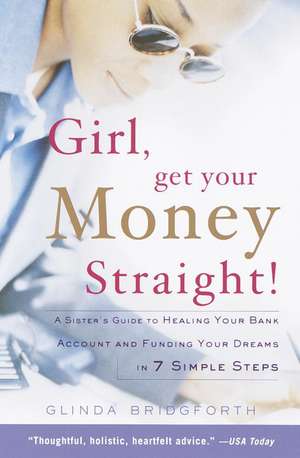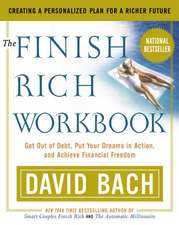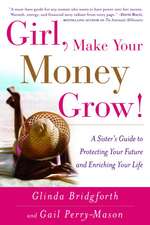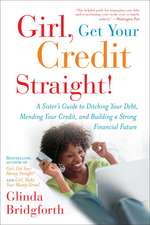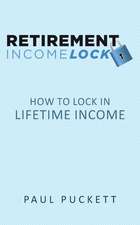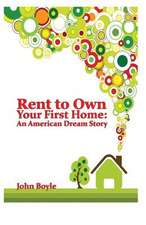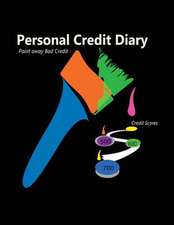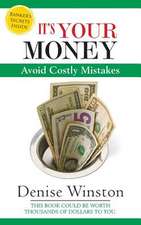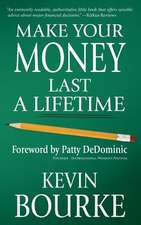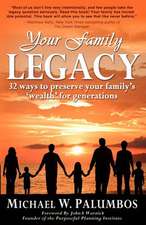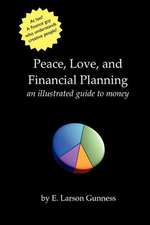Girl, Get Your Money Straight: A Sister's Guide to Healing Your Bank Account and Funding Your Dreams in 7 Simple Steps
Autor Glinda Bridgforthen Limba Engleză Paperback – 31 dec 2001
Preț: 110.60 lei
Nou
Puncte Express: 166
Preț estimativ în valută:
21.17€ • 22.98$ • 17.78£
21.17€ • 22.98$ • 17.78£
Carte disponibilă
Livrare economică 01-15 aprilie
Preluare comenzi: 021 569.72.76
Specificații
ISBN-13: 9780767904889
ISBN-10: 0767904885
Pagini: 276
Dimensiuni: 140 x 208 x 15 mm
Greutate: 0.32 kg
Ediția:Trade Pbk.
Editura: Crown Business
ISBN-10: 0767904885
Pagini: 276
Dimensiuni: 140 x 208 x 15 mm
Greutate: 0.32 kg
Ediția:Trade Pbk.
Editura: Crown Business
Notă biografică
GLINDA BRIDGFORTH is the founder of Bridgforth Financial Management Group, a financial management agency that emphasizes holistic counseling. A regular contributor to Essence and Black Enterprise, she is a frequent guest on television and radio shows nationwide as well as a sought-after seminar speaker. She divides her time between Oakland, California, and Detroit, Michigan.
Extras
Chapter One
The Road to Financial Healing
Whether you are one of those sisters who owe more than they own, or you are scuffling to make ends meet on a solid income that would make your mama's jaw drop and say, "Girl, you make how much money?" believe this: We can all learn to shrink our debt, expand our investments, and cultivate financial health, wealth, and peace of mind.
Believe me, I know this is true. The publication of Girl, Get Your Money Straight! marks my twenty-fifth year as a financial professional. After a successful career as a retail-banking executive, I have worked for the last decade as an independent consultant, coaching sisters just like you and me through the often tricky waters of money management. I call myself a financial recovery specialist, highly experienced in helping clients who are financially challenged in a variety of ways. I assist them in designing and implementing a personalized program of debt reduction and planned spending to stabilize their finances, dig themselves out of familiar money and credit traps, and ultimately build up savings to invest for their futures.
While I have worked with hundreds of clients from all ethnic backgrounds and walks of life, I have been astonished by the number of eager black women who have flocked to my popular group workshop, Money Management: Achieving Prosperity and Debt-Free Living. In 1994 I presented this workshop for the African American Women on Tour Conference, and a standing-room-only crowd of more than two hundred African American women of all ages showed up at an Oakland hotel, ready to learn the strategies and techniques that would help them get their money straight and foster true financial healing. They brought enough energy into that room to light up the whole city, and it was a beautiful sight to behold.
I stood before that audience as a money-management expert, but just as important, as a sister. As an African American woman, I know firsthand our hunger for straightforward financial information that directly connects with how we live, the feelings we have about ourselves, how we interact with the world at large, and the dreams we want to realize.
I also stood before that audience as a firsthand testament to the powers of change that lie within each and every one of us. I am not the kind of financial expert who has always had it all together in my own financial life. I've dealt with many of the challenges typically faced by upwardly mobile African Americans who have come of age since the 1970s. Having benefited from access to education and job opportunities most of our parents didn't have, I am part of a generation of African Americans whose buying power is expected to exceed $533 billion in 2000, up from $350 billion in 1990. That's a 70-percent increase over the last decade! But access to larger incomes doesn't automatically bring the confidence and knowledge it takes to manage money well and turn it into wealth. Some of us grew up poor or were raised by folks who grew up with very little and unwittingly passed on to us high levels of insecurity, self-criticism, and self-doubt in all areas of our lives--especially in finance. And like many Americans, once we have money in our pockets, many of us quite innocently get caught up in our capacity to consume. Eventually, we find ourselves bogged down by overwhelming debt and bad credit habits that have been fueled by psychological vulnerabilities that undermine our confidence to control our financial lives.
I help clients, as I once had to help myself, to examine and work through the close link between how we feel about ourselves in relation to money and how effectively or ineffectively we manage our financial lives. Since both psychological and practical barriers prevent us from moving beyond compulsive spending to planned spending and conscious wealth building, I have found that a holistic approach--that is, one that incorporates both the emotional and the practical and works to heal the individual as well as her bank account--best facilitates change. Such an approach worked for me during my own financial recovery, and I've since found that it works for the hundreds of clients I've seen in my practice and in the workshops I've conducted over the last ten years. Taking a close look inside our minds and hearts is often the key to taking control of our fiscal responsibilities.
The Psychology of Money Management
In the 1970s feminists first called attention to the source of a common pattern in women's financial behaviors--a pattern of passivity and doubt in our ability to take control because of childhood socialization as females. We have commonly been taught and encouraged to leave to men any issues relating to power--specifically control of money. A popular statement was "Oh, don't worry your pretty little head about such things." Psychologist Phyllis Chesler in her 1976 book Women, Money and Power explored women's attitudes, values, and ultimately our habits and actions regarding money in relation to our training and life experience. This social-psychological perspective struck a responsive chord with many people, but not until the 1990s were these psychological insights adopted widely by mainstream financial experts and used to help the general consumer. National bestsellers like Your Money or Your Life by Joe Dominguez and Vicki Robin and The 9 Steps to Financial Freedom by Suze Orman are two excellent examples of very helpful books that use this approach.
People of all races and both genders are products of distinctive cultural histories and family messages that are passed on from generation to generation. These familial and social expectations influence the capabilities, competence, and expectations we have for ourselves in all areas of our lives. Black women, even though we have a longer collective history in the paid labor force than white women, may be especially weighted down by negative messages from our families and the larger society regarding both our personal and economic status, so it's hardly a coincidence that our financial affairs often mirror an underlying personal sense of inadequacy. In actuality, black women today are the products of generations of resourceful women and men who held their families together with little support--material or otherwise--and despite a lot of economic deprivation. But too often society calls attention to our historically degraded social status rather than our triumphs over it.
If we're going to get our money straight, we must become aware of various kinds of emotional conditioning and how we act it out in our financial lives. Perhaps black women more than anyone else can benefit from a holistic approach that addresses our commonplace emotional conflicts. Of course, there are many African Americans who do not struggle with money issues and who have perfectly healthy spending and saving habits. But those of us who do overspend are often caught up in an unconscious attempt to make ourselves feel acceptable in a world that often seems to be working against us.
In a society in which financial status is an important part of what makes people "successful," spending often becomes a means of self-affirmation. But spending to make ourselves feel better--to feel as though we have a certain place in the world--can actually trap us in a downward spiral: The more shame we feel over mounting debts and finances that are not as we'd like them to be, the more paralyzed we become, even prone to depression. And the worse we feel, the more we spend. Ultimately, our money woes can feel like a festering wound that never heals. Consider the following stories of two sisters who found themselves in a dangerous cycle of feel-good spending and debilitating debt.
Living Beyond Your Means
A typical client is Felicia, who at twenty-seven is challenged by the most important mental hurdle in controlling finances: setting priorities and making choices. Five years out of college, she landed a dream job as a marketing communications assistant in a cosmetics company. But despite its glamorous aura, the entry-level job pays only $27,000 a year. That doesn't go very far in covering her average monthly expenses of about $2,100. Her monthly take-home pay: $1,640. She has been living in the red and falling in deeper.
A young single woman with no children, Felicia loves to travel and has taken a big trip almost every year since college. She financed trips to Paris and Jamaica by using her rent money, after which she spent months juggling her other bill payments, scrambling to play catch-up. Delinquent payments severely affected her credit standing. Today she takes cash advances on her Visa just to buy transit cards to get to and from work.
The Secret Spendthrift Syndrome
My client Corliss, a vibrant and youthful forty-six-year-old sister who wears attractive baby dreadlocks, is blessed with an annual income of $57,000 and had $8,000 in debt. Her income puts her in the top 2 percent of African American women earners, and her debt burden isn't outrageously high. Still, Corliss shifted uncomfortably in her chair all through our first session. Other than a small 401K retirement savings plan, she had no significant assets. She was renting her apartment, leasing her car, and although she considered herself a homebody and no big-time spender, her paycheck barely covered her total expenses. She didn't know where her money was going and was afraid she wouldn't have enough to live on after retirement.
While she presented a confident image to the world, she admitted, "I'm very embarrassed by my financial situation. I'm forty-six years old, but I feel like a little child. Up until now I've never been willing to face my finances because it felt so uncomfortable. I just figure if I look good, everybody will think I'm okay. I've got tons of clothes, and it feels really good to shop. But usually by the time I get home I feel terrible and get an awful headache. It's a vicious cycle and I'm stuck in it. What's wrong with me?"
If you, like Corliss and Felicia, haven't yet been able to set a sound course for growth, don't worry--this book gives you the tools you need to identify destructive money patterns and take charge of your home economics. I know that you can do it--because I did. More than a dozen years ago I was burned-out by a high-powered banking career and by a marriage that wasn't working. My finances, too, were running out of control. As I worked to get my life back on track, I came to understand how not feeling worthy and not loving yourself can create patterns of money misuse, leaving us prone to compulsive spending to salve our insecurities. I believe that understanding these potential connections not only promotes health and healing for people suffering from acute financial problems, it can also be a source of valuable insight--an instructive preventive measure even--for many who never fall prey to serious binge spending and the like. We can learn how to avoid sabotaging our own financial security and use the same insights to increase our options for building wealth--whether or not we ourselves are actually secret spendthrifts. I share my own story as a case in point.
My Financial Roots
I am proud to be from Detroit--the Motor City. That's where I was born and where my parents raised their family of six children from 1945 through 1980, always working hard to make ends meet and to educate us for the greater opportunities they expected we would have. The fourth in line, I was a teenager in the 1960s, when the Motown sound dominated radio airwaves and emanated from every Friday- or Saturday-night house party in those days of "blue lights in the basement." It was a magical time. The auto industry was booming, and many folks we knew who worked for the car factories drove shiny new Pontiac Bonnevilles, Buick Electra 225s, and even the ever-popular Cadillac Eldorado. Meanwhile, Berry Gordy, former auto-worker-turned-impresario, built his Motown label by tapping into talented local singers and musicians seasoned in our churches, community centers, and record hops. My homegirls and I would change up weekly on the girl groups we imitated--The Marvelettes, Martha and the Vandellas, the Supremes. Then there were guy groups we swooned over--Smokey Robinson and the Miracles, the Four Tops, and, of course, the "Tempting" Temptations.
I grew up thinking our family was pretty much average and middle class. I knew we weren't poor, because I saw families in my southwest Detroit neighborhood who had much less than we did. We owned our home, always had plenty to eat, dressed pretty well, periodically went south on vacation to visit relatives, and even bought a new car every few years. I also knew there were other kids who had much more than we had--more clothes, larger homes, better cars, and vacations in places I hadn't heard of.
But I had no concept of real wealth and was well into adulthood before I realized that my family was not middle class. At best, we were a striving blue-collar family, and my hardworking parents struggled to give their children what middle-class comforts and security we had--Dad by holding several jobs and Mom by vigilant household management to stretch the money as far as she could.
I can't remember a time when my dad didn't work at least two jobs to support us all. He had a full-time job as a steelworker in a local plant. It was tough and dirty work: The hot air at the plant was filled with soot, and Dad put in eight-, twelve-, and sometimes sixteen-hour shifts. But while putting in thirty-six years at the steel mill, he also held down part-time jobs as a custodian, working ten years at one position and twenty-two years at another.
Mom toiled long hours too, keeping our home spotless, preparing meals, and managing her brood. She also did occasional domestic work in the homes of middle-class white folks and later earned a few extra dollars as a lunchroom attendant at the neighborhood elementary school. But because she was so busy running our large household, she was largely dependent upon my father for financial support.
My parents shared a strong work ethic, and I know they struggled to meet their obligations, but they always had good credit. My dad told me recently that creating excessive debt was never an issue for him because he knew "it was not hard to get credit, just hard to pay it back." Ironically I didn't grasp the substance of that message until I was in my mid-thirties.
I feel incredibly grateful when I think of what my parents endured over the years to provide the best they could for their family. It took extraordinary courage and sacrifice, and the effort left them little time or energy for emotional nurturing or close attention to building their children's self-esteem. I don't particularly remember their saying "I love you" or "I'm proud of you," but I know my folks nurtured me the best they could.
The Road to Financial Healing
Whether you are one of those sisters who owe more than they own, or you are scuffling to make ends meet on a solid income that would make your mama's jaw drop and say, "Girl, you make how much money?" believe this: We can all learn to shrink our debt, expand our investments, and cultivate financial health, wealth, and peace of mind.
Believe me, I know this is true. The publication of Girl, Get Your Money Straight! marks my twenty-fifth year as a financial professional. After a successful career as a retail-banking executive, I have worked for the last decade as an independent consultant, coaching sisters just like you and me through the often tricky waters of money management. I call myself a financial recovery specialist, highly experienced in helping clients who are financially challenged in a variety of ways. I assist them in designing and implementing a personalized program of debt reduction and planned spending to stabilize their finances, dig themselves out of familiar money and credit traps, and ultimately build up savings to invest for their futures.
While I have worked with hundreds of clients from all ethnic backgrounds and walks of life, I have been astonished by the number of eager black women who have flocked to my popular group workshop, Money Management: Achieving Prosperity and Debt-Free Living. In 1994 I presented this workshop for the African American Women on Tour Conference, and a standing-room-only crowd of more than two hundred African American women of all ages showed up at an Oakland hotel, ready to learn the strategies and techniques that would help them get their money straight and foster true financial healing. They brought enough energy into that room to light up the whole city, and it was a beautiful sight to behold.
I stood before that audience as a money-management expert, but just as important, as a sister. As an African American woman, I know firsthand our hunger for straightforward financial information that directly connects with how we live, the feelings we have about ourselves, how we interact with the world at large, and the dreams we want to realize.
I also stood before that audience as a firsthand testament to the powers of change that lie within each and every one of us. I am not the kind of financial expert who has always had it all together in my own financial life. I've dealt with many of the challenges typically faced by upwardly mobile African Americans who have come of age since the 1970s. Having benefited from access to education and job opportunities most of our parents didn't have, I am part of a generation of African Americans whose buying power is expected to exceed $533 billion in 2000, up from $350 billion in 1990. That's a 70-percent increase over the last decade! But access to larger incomes doesn't automatically bring the confidence and knowledge it takes to manage money well and turn it into wealth. Some of us grew up poor or were raised by folks who grew up with very little and unwittingly passed on to us high levels of insecurity, self-criticism, and self-doubt in all areas of our lives--especially in finance. And like many Americans, once we have money in our pockets, many of us quite innocently get caught up in our capacity to consume. Eventually, we find ourselves bogged down by overwhelming debt and bad credit habits that have been fueled by psychological vulnerabilities that undermine our confidence to control our financial lives.
I help clients, as I once had to help myself, to examine and work through the close link between how we feel about ourselves in relation to money and how effectively or ineffectively we manage our financial lives. Since both psychological and practical barriers prevent us from moving beyond compulsive spending to planned spending and conscious wealth building, I have found that a holistic approach--that is, one that incorporates both the emotional and the practical and works to heal the individual as well as her bank account--best facilitates change. Such an approach worked for me during my own financial recovery, and I've since found that it works for the hundreds of clients I've seen in my practice and in the workshops I've conducted over the last ten years. Taking a close look inside our minds and hearts is often the key to taking control of our fiscal responsibilities.
The Psychology of Money Management
In the 1970s feminists first called attention to the source of a common pattern in women's financial behaviors--a pattern of passivity and doubt in our ability to take control because of childhood socialization as females. We have commonly been taught and encouraged to leave to men any issues relating to power--specifically control of money. A popular statement was "Oh, don't worry your pretty little head about such things." Psychologist Phyllis Chesler in her 1976 book Women, Money and Power explored women's attitudes, values, and ultimately our habits and actions regarding money in relation to our training and life experience. This social-psychological perspective struck a responsive chord with many people, but not until the 1990s were these psychological insights adopted widely by mainstream financial experts and used to help the general consumer. National bestsellers like Your Money or Your Life by Joe Dominguez and Vicki Robin and The 9 Steps to Financial Freedom by Suze Orman are two excellent examples of very helpful books that use this approach.
People of all races and both genders are products of distinctive cultural histories and family messages that are passed on from generation to generation. These familial and social expectations influence the capabilities, competence, and expectations we have for ourselves in all areas of our lives. Black women, even though we have a longer collective history in the paid labor force than white women, may be especially weighted down by negative messages from our families and the larger society regarding both our personal and economic status, so it's hardly a coincidence that our financial affairs often mirror an underlying personal sense of inadequacy. In actuality, black women today are the products of generations of resourceful women and men who held their families together with little support--material or otherwise--and despite a lot of economic deprivation. But too often society calls attention to our historically degraded social status rather than our triumphs over it.
If we're going to get our money straight, we must become aware of various kinds of emotional conditioning and how we act it out in our financial lives. Perhaps black women more than anyone else can benefit from a holistic approach that addresses our commonplace emotional conflicts. Of course, there are many African Americans who do not struggle with money issues and who have perfectly healthy spending and saving habits. But those of us who do overspend are often caught up in an unconscious attempt to make ourselves feel acceptable in a world that often seems to be working against us.
In a society in which financial status is an important part of what makes people "successful," spending often becomes a means of self-affirmation. But spending to make ourselves feel better--to feel as though we have a certain place in the world--can actually trap us in a downward spiral: The more shame we feel over mounting debts and finances that are not as we'd like them to be, the more paralyzed we become, even prone to depression. And the worse we feel, the more we spend. Ultimately, our money woes can feel like a festering wound that never heals. Consider the following stories of two sisters who found themselves in a dangerous cycle of feel-good spending and debilitating debt.
Living Beyond Your Means
A typical client is Felicia, who at twenty-seven is challenged by the most important mental hurdle in controlling finances: setting priorities and making choices. Five years out of college, she landed a dream job as a marketing communications assistant in a cosmetics company. But despite its glamorous aura, the entry-level job pays only $27,000 a year. That doesn't go very far in covering her average monthly expenses of about $2,100. Her monthly take-home pay: $1,640. She has been living in the red and falling in deeper.
A young single woman with no children, Felicia loves to travel and has taken a big trip almost every year since college. She financed trips to Paris and Jamaica by using her rent money, after which she spent months juggling her other bill payments, scrambling to play catch-up. Delinquent payments severely affected her credit standing. Today she takes cash advances on her Visa just to buy transit cards to get to and from work.
The Secret Spendthrift Syndrome
My client Corliss, a vibrant and youthful forty-six-year-old sister who wears attractive baby dreadlocks, is blessed with an annual income of $57,000 and had $8,000 in debt. Her income puts her in the top 2 percent of African American women earners, and her debt burden isn't outrageously high. Still, Corliss shifted uncomfortably in her chair all through our first session. Other than a small 401K retirement savings plan, she had no significant assets. She was renting her apartment, leasing her car, and although she considered herself a homebody and no big-time spender, her paycheck barely covered her total expenses. She didn't know where her money was going and was afraid she wouldn't have enough to live on after retirement.
While she presented a confident image to the world, she admitted, "I'm very embarrassed by my financial situation. I'm forty-six years old, but I feel like a little child. Up until now I've never been willing to face my finances because it felt so uncomfortable. I just figure if I look good, everybody will think I'm okay. I've got tons of clothes, and it feels really good to shop. But usually by the time I get home I feel terrible and get an awful headache. It's a vicious cycle and I'm stuck in it. What's wrong with me?"
If you, like Corliss and Felicia, haven't yet been able to set a sound course for growth, don't worry--this book gives you the tools you need to identify destructive money patterns and take charge of your home economics. I know that you can do it--because I did. More than a dozen years ago I was burned-out by a high-powered banking career and by a marriage that wasn't working. My finances, too, were running out of control. As I worked to get my life back on track, I came to understand how not feeling worthy and not loving yourself can create patterns of money misuse, leaving us prone to compulsive spending to salve our insecurities. I believe that understanding these potential connections not only promotes health and healing for people suffering from acute financial problems, it can also be a source of valuable insight--an instructive preventive measure even--for many who never fall prey to serious binge spending and the like. We can learn how to avoid sabotaging our own financial security and use the same insights to increase our options for building wealth--whether or not we ourselves are actually secret spendthrifts. I share my own story as a case in point.
My Financial Roots
I am proud to be from Detroit--the Motor City. That's where I was born and where my parents raised their family of six children from 1945 through 1980, always working hard to make ends meet and to educate us for the greater opportunities they expected we would have. The fourth in line, I was a teenager in the 1960s, when the Motown sound dominated radio airwaves and emanated from every Friday- or Saturday-night house party in those days of "blue lights in the basement." It was a magical time. The auto industry was booming, and many folks we knew who worked for the car factories drove shiny new Pontiac Bonnevilles, Buick Electra 225s, and even the ever-popular Cadillac Eldorado. Meanwhile, Berry Gordy, former auto-worker-turned-impresario, built his Motown label by tapping into talented local singers and musicians seasoned in our churches, community centers, and record hops. My homegirls and I would change up weekly on the girl groups we imitated--The Marvelettes, Martha and the Vandellas, the Supremes. Then there were guy groups we swooned over--Smokey Robinson and the Miracles, the Four Tops, and, of course, the "Tempting" Temptations.
I grew up thinking our family was pretty much average and middle class. I knew we weren't poor, because I saw families in my southwest Detroit neighborhood who had much less than we did. We owned our home, always had plenty to eat, dressed pretty well, periodically went south on vacation to visit relatives, and even bought a new car every few years. I also knew there were other kids who had much more than we had--more clothes, larger homes, better cars, and vacations in places I hadn't heard of.
But I had no concept of real wealth and was well into adulthood before I realized that my family was not middle class. At best, we were a striving blue-collar family, and my hardworking parents struggled to give their children what middle-class comforts and security we had--Dad by holding several jobs and Mom by vigilant household management to stretch the money as far as she could.
I can't remember a time when my dad didn't work at least two jobs to support us all. He had a full-time job as a steelworker in a local plant. It was tough and dirty work: The hot air at the plant was filled with soot, and Dad put in eight-, twelve-, and sometimes sixteen-hour shifts. But while putting in thirty-six years at the steel mill, he also held down part-time jobs as a custodian, working ten years at one position and twenty-two years at another.
Mom toiled long hours too, keeping our home spotless, preparing meals, and managing her brood. She also did occasional domestic work in the homes of middle-class white folks and later earned a few extra dollars as a lunchroom attendant at the neighborhood elementary school. But because she was so busy running our large household, she was largely dependent upon my father for financial support.
My parents shared a strong work ethic, and I know they struggled to meet their obligations, but they always had good credit. My dad told me recently that creating excessive debt was never an issue for him because he knew "it was not hard to get credit, just hard to pay it back." Ironically I didn't grasp the substance of that message until I was in my mid-thirties.
I feel incredibly grateful when I think of what my parents endured over the years to provide the best they could for their family. It took extraordinary courage and sacrifice, and the effort left them little time or energy for emotional nurturing or close attention to building their children's self-esteem. I don't particularly remember their saying "I love you" or "I'm proud of you," but I know my folks nurtured me the best they could.
Descriere
Iyanla Vanzant meets Suze Orman in this bestselling handbook for financial health from a leading source of financial advice for African-American women.
